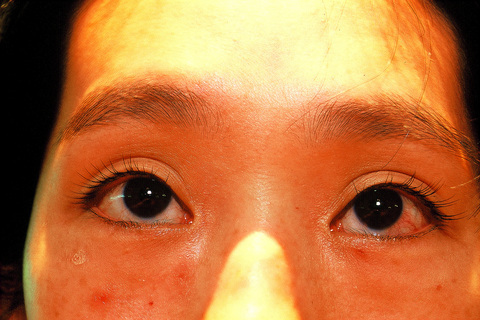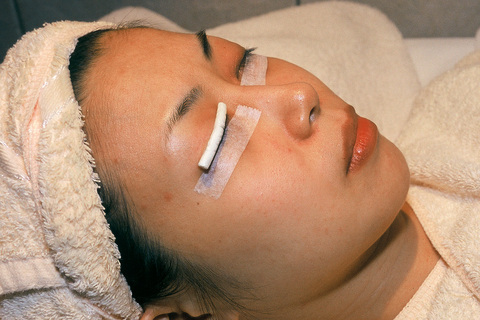Spending time and money to look good is no recent trend in Taiwan but salons and spas are multiplying in Taipei and are offering beauty-conscious women the latest fashion in cosmetic treatments.
"There are no ugly women only lazy women" (

PHOTOS COURTESY OF ASHLEY PENG
It's a common saying (at least it is in the beauty industry) that suggests everyone has hidden beauty and only needs to spend a little time to bring it out.

Taiwan's salons go more than skin deep, because as Lee explained, "We spoil them [clients] for a few hours and make them feel good on the inside. When they feel good, they look good."
In the past, women went to hair salons to have their hair styled and nails painted, she said. Now, with more financial freedom and leisure time they're experimenting with their appearances.
A new look includes everything from a NT$400 eyelash perming at a simple beauty salon to a NT$4,500 body mask at an extravagant day spa.
Taiwan's spa sector has evolved from the hair parlors of 30 years ago into the luxury beauty centers of today, said Shenyn Wang (
"When spas first originated in Taiwan, they were based on those in Japan that offer body masks and massages, but today they are a combination of the Japanese style and the European cosmetic centers, which offer facials and cosmetic services," she said.
According to Wang, the Ministry of Economic Affairs does not have an annual earnings report for the spa industry. Part of the reason is that it falls under the beauty sector, which includes hair salons, slimming parlors and fitness centers, but more importantly because 30 percent of the industry is made up of unlicensed business.
"Taiwan's beauty spas have multiplied in numbers. You can find one on every street now. But the quality of service varies from spa to spa," she said.
Lee's spa, Bourgesu, like most mid-to-high-end beauty salons, has an extremely relaxing environment. The soft lighting, new-age music, herbal tea and aromatherapy are all devices to make spending a few hours there feel like a brief escape from the city.
Eighty percent of Lee's customers come for facials and are the 35 to 45-year-old wives of wealthy businessmen. There are anti-wrinkle, re-hydrating and revitalizing facials with prices ranging from NT$2,200 to NT$4,500, but the most popular facial treatment is whitening.
Facials are where most salons make their profit, but a few advancements in cosmetic techniques have become fashionable among the young and old. Tattooing eyeliner and eyebrows has given way to perming and fake eyelashes, the latest trends in the beauty industry, Lee said.
Kobayashi Makae, who moved to Taiwan from Japan eight months ago, had her eyelashes permed for the first time last Saturday. She normally goes to the spa twice a month for a body mask and facial, spending approximately NT$15,000 a month.
Another loyal yet less frequent customer, Wang Pei-hua (王珮華) said she goes once every two months for a two-hour facial. Last Saturday she opted for an extra one-hour body massage because she was getting married the next day. When asked what makes a 22-year-old woman decide to get a facial she said, "It makes my skin look brighter and feel softer.
When her fiance was asked if he noticed any difference he replied, "No, but if it makes her happy then that's enough. But I think it takes too long," he added at the beginning of his three-hour wait.
Perming eyelashes originated in Korea a decade ago, but it never reached the level of popularity there that it has in Taiwan. It is also a relatively new phenomenon in Japan, according to Makae, who added that her friends have it done whenever they come from Japan to visit.
The process takes 45 minutes to one hour and lasts six to eight weeks. Depending on the salon, it costs between NT$400 and NT$800. A small, white tube is fitted around the upper and bottom eyelashes and a diluted perm solution is applied to the tips.
According to Lee, perming does not make the lashes weaker and it is safer than using a metal eyelash curler, which pulls the lashes at the roots and can cause them to break or fall out.
The downside to perming eyelashes, however, is that it makes them appear shorter than before. To get longer, curlier and fuller lashes, they need to be fake, said Lee, who added that more women are opting for fake eyelashes instead of perming.
In the past, synthetic lashes were glued onto the eyelid and could easily cause infection, but now they are attached to a person's real lashes and can last up to three months.
The technique has proven popular and since its introduction on the Taiwan market from America less than a year ago the number of clients wanting fake eyelashes has doubled.
NT$1,500 and one hour later, Hsu Hsing-hsien's (
"It looks natural, right?" Hsu asked, adding, "I think it looks good, I look good."
Her eyelashes might be artificial but her happiness is real.

June 2 to June 8 Taiwan’s woodcutters believe that if they see even one speck of red in their cooked rice, no matter how small, an accident is going to happen. Peng Chin-tian (彭錦田) swears that this has proven to be true at every stop during his decades-long career in the logging industry. Along with mining, timber harvesting was once considered the most dangerous profession in Taiwan. Not only were mishaps common during all stages of processing, it was difficult to transport the injured to get medical treatment. Many died during the arduous journey. Peng recounts some of his accidents in

“Why does Taiwan identity decline?”a group of researchers lead by University of Nevada political scientist Austin Wang (王宏恩) asked in a recent paper. After all, it is not difficult to explain the rise in Taiwanese identity after the early 1990s. But no model predicted its decline during the 2016-2018 period, they say. After testing various alternative explanations, Wang et al argue that the fall-off in Taiwanese identity during that period is related to voter hedging based on the performance of the Democratic Progressive Party (DPP). Since the DPP is perceived as the guardian of Taiwan identity, when it performs well,

The Taiwan People’s Party (TPP) on May 18 held a rally in Taichung to mark the anniversary of President William Lai’s (賴清德) inauguration on May 20. The title of the rally could be loosely translated to “May 18 recall fraudulent goods” (518退貨ㄌㄨㄚˋ!). Unlike in English, where the terms are the same, “recall” (退貨) in this context refers to product recalls due to damaged, defective or fraudulent merchandise, not the political recalls (罷免) currently dominating the headlines. I attended the rally to determine if the impression was correct that the TPP under party Chairman Huang Kuo-Chang (黃國昌) had little of a

A short walk beneath the dense Amazon canopy, the forest abruptly opens up. Fallen logs are rotting, the trees grow sparser and the temperature rises in places sunlight hits the ground. This is what 24 years of severe drought looks like in the world’s largest rainforest. But this patch of degraded forest, about the size of a soccer field, is a scientific experiment. Launched in 2000 by Brazilian and British scientists, Esecaflor — short for “Forest Drought Study Project” in Portuguese — set out to simulate a future in which the changing climate could deplete the Amazon of rainfall. It is